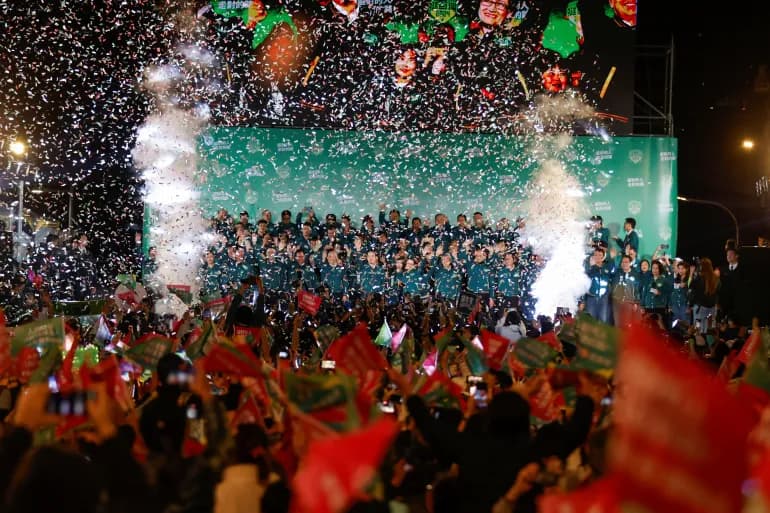We're loading the full news article for you. This includes the article content, images, author information, and related articles.
Beijing's move to formalize October 25th as a day of commemoration intensifies cross-strait tensions, placing diplomatic allies like Kenya in a familiar position of balancing economic ties with geopolitical complexities.

China's top legislative body, the Standing Committee of the National People's Congress (NPC), on Friday, October 24, 2025, officially designated October 25th as the "Commemoration Day of Taiwan's Restoration." According to Chinese state media, the decision was made to safeguard the outcomes of the World Anti-Fascist War and the post-war international order, and to demonstrate the firm will to uphold the "one-China principle." The date marks the 80th anniversary of Japan's surrender and the handover of Taiwan to the then-Republic of China (ROC) in 1945 at the end of World War II. Shen Chunyao, director of the NPC Standing Committee’s Legislative Affairs Commission, stated that the day's establishment would help “highlight the indisputable historical fact that Taiwan is an inalienable part of China” and “consolidate the international community's commitment to the one-China principle.”
Taiwan's Mainland Affairs Council (MAC) issued a swift and strong condemnation of Beijing's announcement. In a statement released on Friday evening, October 24, 2025, the MAC called the move an attempt to "belittle our country and fabricate the claim that Taiwan belongs to the People's Republic of China (PRC)." The council emphasized that the Taiwanese people would never accept such a move, accusing Beijing of amplifying a "false historical narrative." The MAC clarified that the 1945 event, known in Taiwan as "Retrocession Day," involved the surrender of Japanese forces to the Republic of China (ROC) on behalf of the Allied powers. It pointedly noted that the People's Republic of China was not founded until 1949 and therefore, the event "has nothing to do with the PRC, nor with the CCP [Chinese Communist Party], which made no positive contribution to the war against Japan."
While the Kenyan government has not issued a specific statement on the "Taiwan Restoration Day" announcement (DETAILS UNCONFIRMED), its diplomatic stance remains firmly aligned with Beijing. Kenya has consistently adhered to the "One-China" policy, which recognizes the PRC as the sole legal government of China and Taiwan as an inalienable part of its territory. This position has been reiterated multiple times by high-ranking officials. In November 2024, Principal Secretary for Foreign Affairs, Sing'oei Korir, stated that Nairobi does not recognize Taiwan as a sovereign state, asserting that “Taiwan doesn't meet the threshold for recognition.” This long-standing policy is a cornerstone of the robust economic and infrastructural partnership between Kenya and China, which includes landmark projects like the Standard Gauge Railway and the Nairobi Expressway. The Chinese Ambassador to Kenya, Guo Haiyan, praised Kenya's adherence to the principle at an event in Nairobi in August 2025, calling it a cornerstone of their relationship.
The establishment of this commemorative day is seen by analysts as another step by Beijing to assert its sovereignty claims over Taiwan and to create a historical narrative that supports its goal of "reunification." The move comes amid heightened military activity by China around the island. As of Saturday, October 25, 2025, the United States, the European Union, and the African Union had not issued official statements directly addressing the new designation (DETAILS UNCONFIRMED). However, both the U.S. and the E.U. have repeatedly expressed concerns over actions that unilaterally change the status quo in the Taiwan Strait and have called for the peaceful resolution of differences. The U.S. maintains a robust unofficial relationship with Taiwan under its "One China" policy, which acknowledges Beijing's position without endorsing it. For East Africa, where China is a dominant economic partner for nearly all nations except Eswatini (which recognizes Taiwan), Beijing's intensified focus on its sovereignty claims places regional governments in a delicate diplomatic position. While official policy across the region mirrors Kenya's adherence to the One-China principle, the escalating rhetoric increases the geopolitical complexity for nations navigating their relationships with both global powers.
Keep the conversation in one place—threads here stay linked to the story and in the forums.
Sign in to start a discussion
Start a conversation about this story and keep it linked here.
Other hot threads
E-sports and Gaming Community in Kenya
Active 9 months ago
The Role of Technology in Modern Agriculture (AgriTech)
Active 9 months ago
Popular Recreational Activities Across Counties
Active 9 months ago
Investing in Youth Sports Development Programs
Active 9 months ago